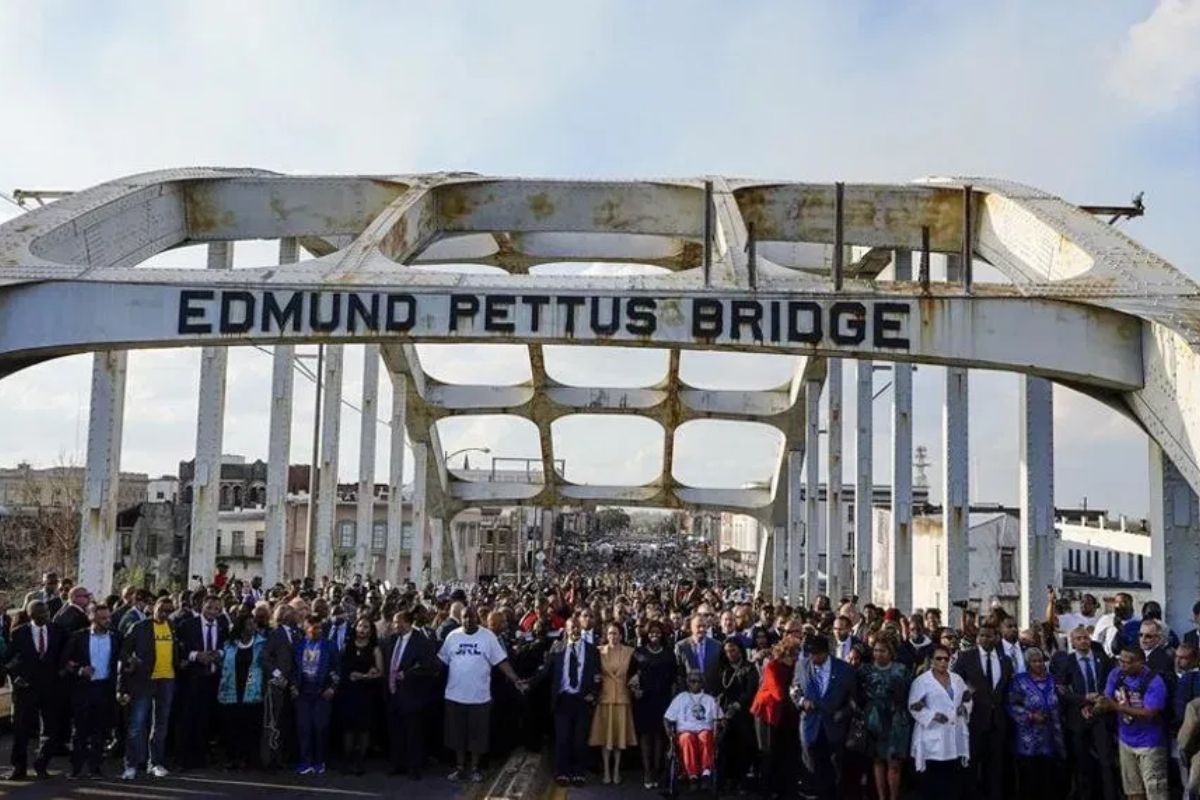Selma 59th Bridge-Crossing Jubilee: The annual Bridge-Crossing Jubilee in Selma has become a cornerstone event in commemorating the civil rights movement’s legacy. This year marks the 59th anniversary of the historic march across the Edmund Pettus Bridge, a pivotal moment in American history.
The theme of unity, education, and remembrance underscores the significance of this event in fostering dialogue and understanding. As the Jubilee unfolds, it not only pays homage to the past but also serves as a platform to address contemporary challenges.
The blend of historical reflection and forward-thinking initiatives sets the stage for a thought-provoking event.
Selma’s 59th Annual Bridge
The Selma’s 59th Annual Bridge-Crossing Jubilee is a significant annual event in Selma, Alabama, marking the historic Bloody Sunday and the Voting Rights Act of 1965. This commemoration, initiated on March 7th, 1965, holds profound historical importance as it pays tribute to the civil rights activists who bravely marched from Selma to Montgomery, including prominent figures like John Lewis and Reverend Hosea Williams. The week-long jubilee, spanning from February 26th to March 3rd, features a series of enlightening, educational, and unifying events designed to honor the sacrifices made during the Selma-to-Montgomery March and the subsequent signing of the Voting Rights Act.
Central to the jubilee is the symbolic Voting Rights Solidarity March over the Edmund Pettus Bridge, a poignant reminder of the struggles faced by those who fought for equal voting rights. Through a blend of remembrance, education, and unity, the Selma’s 59th Annual Bridge-Crossing Jubilee serves as a testament to the ongoing journey towards equality and justice for all.
Historical Significance and Initiators of the Jubilee
With a profound focus on the historical significance and the key initiators of Selma’s 59th Annual Bridge-Crossing Jubilee, attention is directed towards the pivotal moments of the civil rights movement and the individuals who led the charge towards racial equality.
The primary objective of this annual jubilee is to honor significant events such as Bloody Sunday, the Selma-to-Montgomery March, and the signing of the Voting Rights Act of 1965. These events mark crucial milestones in the fight for civil rights and equality in America.
Initiated on March 7th, 1965, the historic march over the Edmund Pettus Bridge was spearheaded by prominent civil rights activists John Lewis and Reverend Hosea Williams. Their courage and determination symbolize the profound struggle for racial equality that defined the civil rights movement.
The efforts of Lewis, Williams, and many others who participated in these events laid the foundation for progress and social change, shaping the course of history in the ongoing pursuit of justice and equality.

ALSO READ: Alabama Senate Bold Move: Tax Breaks for Women and Babies!
Week-Long Jubilee Activities and Educational Initiatives
Throughout the week-long Selma’s 59th Bridge-Crossing Jubilee, a diverse range of engaging and educational activities are organized to commemorate the fight for equality and empower attendees with historical knowledge and contemporary insights. This jubilee, running from February 26th to March 3rd, is a significant event attracting tens of thousands annually, highlighting the enduring importance of the struggle for equality.
One notable activity is the educational summit, where teachers from across the state gather to deepen their understanding of African American history. The summit featured prominent figures such as Faya Toure, an American civil rights activist, and Alabama’s first black woman judge.
Additionally, the ministers of justice round table, attended by students from Selma High School, underscores the event’s emphasis on empowering the youth. These initiatives not only educate participants about the historical context of the civil rights movement but also serve to inspire a new generation to continue the fight for justice and equality.
News in Brief
Selma’s 59th Bridge-Crossing Jubilee, commemorating the historic civil rights march, blends historical reflection and forward-thinking initiatives. The week-long event, from February 26th to March 3rd, pays tribute to the Selma-to-Montgomery March and the Voting Rights Act. The symbolic Voting Rights Solidarity March over the Edmund Pettus Bridge serves as a poignant reminder of the struggles for equal voting rights. Initiated on March 7th, 1965, by civil rights leaders John Lewis and Reverend Hosea Williams, the jubilee honors their courage and pivotal role in the fight for racial equality. Educational activities and initiatives empower attendees with historical knowledge, emphasizing the ongoing journey towards justice and equality.
Our Reader’s Queries
What is the jubilee in Selma Alabama?
The 2024 Bridge Crossing Jubilee marks 59 years since Bloody Sunday, the Selma to Montgomery March, and the signing of the Voting Rights Act of 1965.
Who were the leaders of Bloody Sunday?
March 7, 1965: About 525-600 civil rights marchers, led by John Lewis and Reverend Hosea Williams, embarked southeast from Selma on U.S. Highway 80. Bob Mants of SNCC and Albert Turner of SCLC followed in their footsteps.
Why is Selma Alabama famous?
Selma gained prominence through the 1960s Selma Voting Rights Movement and the iconic Selma to Montgomery marches. The pivotal journey started with the impactful “Bloody Sunday” in March 1965 and concluded with a resounding statement – 25,000 people entering Montgomery at the march’s culmination, all advocating for voting rights.
Why is jubilee called jubilee?
The year of liberty was declared with the resounding blast of a ram’s horn. In Hebrew, this ceremonial horn is known as a yōbhēl, and the jubilant year adopted its name in homage to the echoing sound of this significant instrument.

